|
|
|
Sort Order |
|
|
|
Items / Page
|
|
|
|
|
|
|
| Srl | Item |
| 1 |
ID:
084242
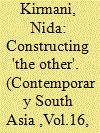

|
|
|
|
|
| Publication |
2008.
|
| Summary/Abstract |
The research for this paper is based in a majority-Muslim neighbourhood in South Delhi, Zakir Nagar. As with most urban localities, the borders around Zakir Nagar are permeable-with residents frequently moving in and out of the neighbourhood and coming into contact with members of other religious groups. Many of the residents of Zakir Nagar have also lived in religiously mixed areas previously. Furthermore, although the neighbourhood is itself identified as 'Muslim', it is by no means homogeneous, so that multiple social boundaries operate even within this locality. This paper looks more closely at the issue of religious identity as it was narrated in relation to various and shifting 'others'. These 'others'-referred to in the context of friendship, neighbours and marriage as well as in terms of discrimination, riots and 'communalism'-were often identified as 'Hindus' or as 'non-Muslims', but were also often referred to members of different class, status or regional groups. Hence, boundaries around 'us' and 'them' shifted according to context and were contingent upon various factors alongside religious identity. Through the narratives of Zakir Nagar residents, religious identity emerged as itself a problematic category whose meaning and
|
|
|
|
|
|
|
|
|
|
|
|
|
|
|
|
| 2 |
ID:
084240
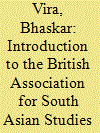

|
|
|
|
|
| Publication |
2008.
|
| Summary/Abstract |
This paper introduces the British Association for South Asian Studies special issue of Contemporary South Asia. Contributions to this volume have been made based on papers presented by participants at the 21st British Association for South Asian Studies Annual Conference held in Cambridge in March 2007. The papers in the collection reflect on different aspects of identity in the contemporary South Asian context, focusing on caste, religion, gender and tribe, and explore the relevance of these signifiers in the lived everyday experiences of these different communities, as well as their broader implications for the contemporary politics of the region.
|
|
|
|
|
|
|
|
|
|
|
|
|
|
|
|
| 3 |
ID:
084239


|
|
|
| 4 |
ID:
084246


|
|
|
| 5 |
ID:
084245
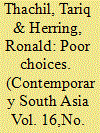

|
|
|
|
|
| Publication |
2008.
|
| Summary/Abstract |
The surprising loss of the Bharatiya Janata Party (BJP)-led national government in India's 2004 general elections has been generally understood as a rejection of the National Democratic Alliance's campaign that celebrated a 'Shining India' among voters who had not shared in the wealth produced by India's recent growth boom-especially Scheduled Caste and Scheduled Tribe electorates. A close look at the empirical evidence demonstrates that Dalit and Adivasi communities were by no means the homogeneous voting block portrayed in many post-election analyses. Nor did the BJP consistently lose in these constituencies. Both findings undermine the currently popular conceptualization of Indian electoral and party behavior as identity-based or ethnic. Instead, the 2004 results confirmed a growing trend for these disadvantaged populations to vote for radically dissimilar parties across different states-from the Communist Party of India (Marxist), to the Congress, to the Bahujan Samaj Party, or indeed to the BJP itself-driven by plausible calculation of interests. Using national election data from the 1999 and 2004 elections, this paper examines the theoretical puzzle this divergent electoral behavior presents to both the comparative literature on cleavage-based party systems and the scholarship on caste and identity politics in India. We argue that at least some of this variance can be explained by the fact that differences in state-level conditions influence which of the array of strategies used by Indian parties to recruit Dalit and Adivasi voters is likely to be successful. We then analyze the specific puzzle of differential BJP success among Adivasi/Dalit communities. We conclude that the embedded nature of the BJP as a party with social movement characteristics, combined with the poor developmental performance of many Indian states for their most disadvantaged populations, opens a spatially and politically differentiated niche for a social-provisioning electoral strategy. Developing this strategy has aided the BJP in overcoming at least partially its legacy as a Brahmin-Bania party.
|
|
|
|
|
|
|
|
|
|
|
|
|
|
|
|
| 6 |
ID:
084244
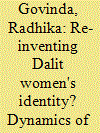

|
|
|
|
|
| Publication |
2008.
|
| Summary/Abstract |
Dalit or ex-untouchable women's voices and perspectives have been marginalized not only in Dalit movements but also in predominantly upper-caste Hindu-led women's movements. This paper aims at exploring the unheard voices and perspectives of Dalit women in the context of Dalit assertion in the state of Uttar Pradesh, north India. Scholarly writing examines the different facets of Dalit political assertion led by the Bahujan Samaj Party in Uttar Pradesh. Few scholars, however, examine the ways in which individual and organizational actors engage with women of Dalit castes through social activism in the state. This paper is an attempt to do so. Specifically, it examines, with special reference to issues of culture and identity, the engagement of a grassroots women's non-governmental organization with rural Dalit women in southern Uttar Pradesh. The paper begins with an enquiry into why engagement with issues of culture and identity is necessary for social activism with Dalit women, and how it is carried out. It then examines whether social activism and electoral politics with Dalit women cross-cut each other, and also what implications this or its lack has for the women. Finally, the paper asks how far activism and politics can go towards re-inventing Dalit (women's) identity.
|
|
|
|
|
|
|
|
|
|
|
|
|
|
|
|
| 7 |
ID:
084243
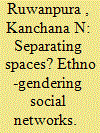

|
|
|
|
|
| Publication |
2008.
|
| Summary/Abstract |
The ways in which gendered processes of identity construction have been deployed in formal spaces, such as work and education, have been closely examined by feminist and postcolonial theorists. They have highlighted the need to consider the ways in which historical and socio-political contours mark women's subjectivity in these spaces. There is less work done on the ways in which ethno-nationalist (read: patriarchal) discursive strategies permeate across ethnic communities to configure everyday cultural practices in informal spaces. Using fieldwork done in eastern Sri Lanka during a one-year period (1998-99) and with follow up study during January-April 2004, this paper foregrounds the material and social spaces, namely networks, within which women exercise their everyday agency. I focus on women's narratives to show how networks are simultaneously supportive and oppressive because of ethno-nationalist practices produced in and through these informal spaces. Since the spatiality of networks perform both a private sphere activity, namely caring work, and yet control and monitor women's behaviour, a marker generally associated with the public sphere, I argue that networks located in a denaturalized and historically specific context may help blur the binary positioning that has been a hallmark of modernist thinking.
|
|
|
|
|
|
|
|
|
|
|
|
|
|
|
|
|
|
|
|
|